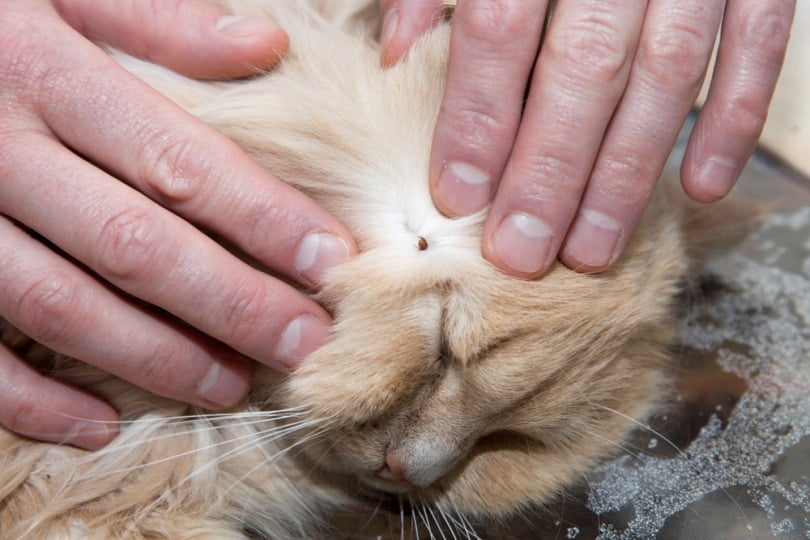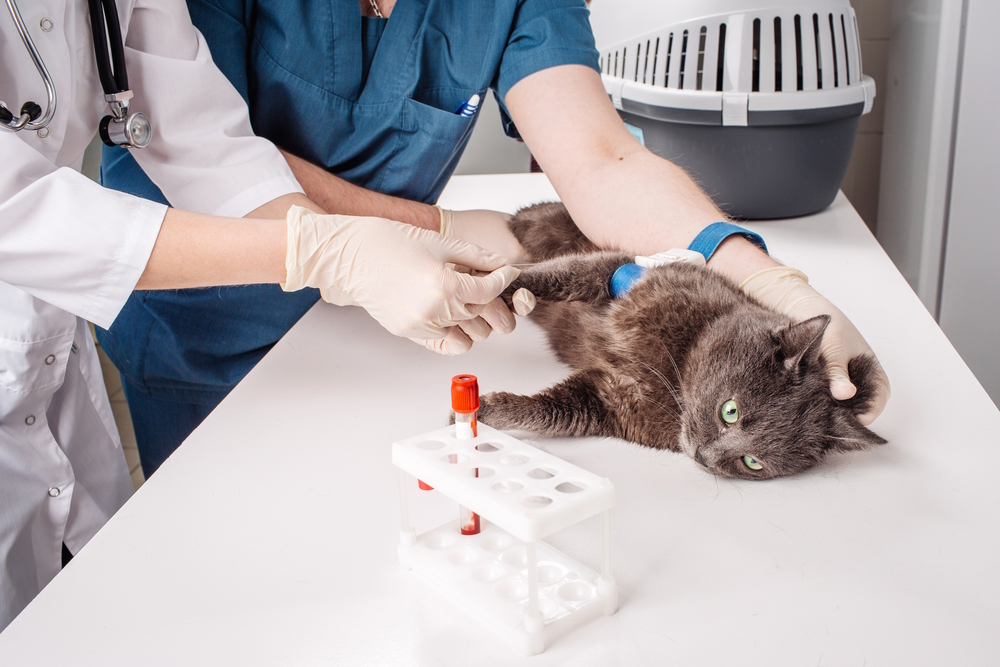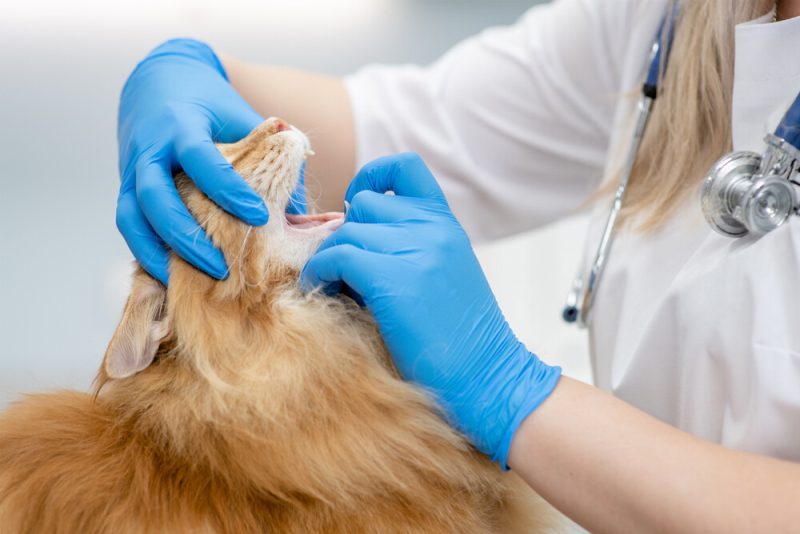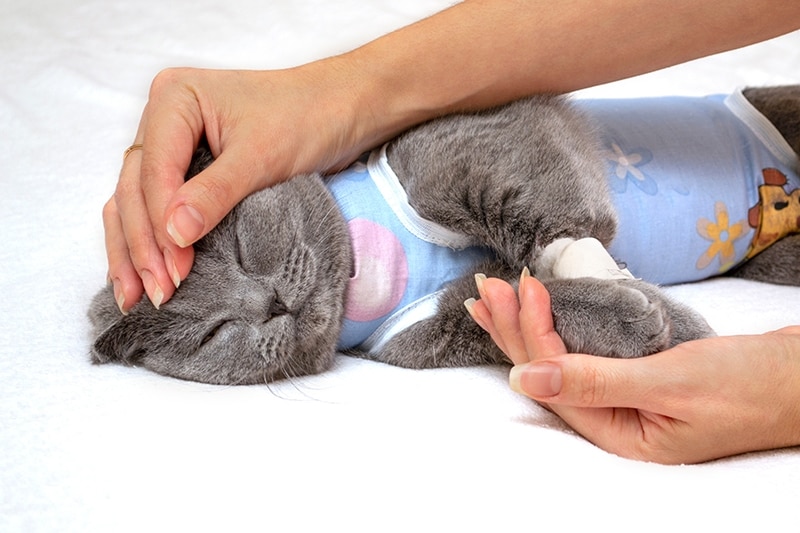Owning a cat, especially one that enjoys roaming outdoors, comes with the concern of seasonal ticks. As a human, finding a tick firmly attached to your skin is concerning, and it evokes immediate worry about tick bite fever and Lyme disease. It is not much different for our cats, but you do not need to be overly concerned as a cat owner.
Even though the bacteria that causes Lyme disease can infect cats, the disease has never been seen in a cat outside of a laboratory setting. Lyme disease in cats is possible but very uncommon. However, it’s best to understand how the disease is transmitted and the signs of infection in your pets.

How Do Ticks Give Cats Lyme Disease?
Some ticks, including the deer tick, carry the bacteria known as Borrelia burgdorferi, which causes Lyme disease and can affect humans and dogs but rarely cats. Ticks affect cats by biting them and spreading the parasite through their saliva, but some ticks at different stages of their life cycle are more likely to transmit Lyme disease to your cat.
The parasite will transmit the disease through saliva 24 to 48 hours after the tick is attached. The signs usually appear 2–5 months after the tick bites, but most cats don’t present any.

Signs of Lyme Disease in Cats
Lyme disease signs in cats are uncommon. A bull’s eye-shaped ring around the bite is typical in humans but unusual in cats and dogs. If your cat has Lyme disease, the most common signs will include:
- Fever
- Lameness
- Fatigue
- Loss of appetite
- Difficulty breathing
Animals with a more severe form of Lyme disease that affects their kidneys may display the following:
- Excess swelling in the limbs
- Weight Loss
- Vomiting
- Extreme lethargy
- Frequent urination
How Is Lyme Disease Diagnosed?
Lyme disease is diagnosed primarily through the cat’s history, signs, lab tests, and the exclusion of other diseases with similar signs. Other conditions should be considered first because Lyme disease is uncommon in cats.
A simple, low-cost blood test can be used to screen for Lyme disease. To rule out or diagnose other conditions that may be causing similar signs, additional tests are used, and if a cat tests positive, more testing will be done to determine how severe the disease is.
Cats exposed to Lyme disease may not test positive for the condition for 2 to 8 weeks. If you find a tick on your cat, your vet can send it for testing to determine if it carries any diseases and can advise you on tests and treatments suitable for your cat.

Treatment for Lyme Disease in Cats
According to research, cats treated immediately for tick-borne diseases have a better chance of full recovery than cats treated later. Your veterinarian may recommend an antibiotic for your cat, but it may not suit all felines. They are typically prescribed for 30 days, but some cats require additional courses to prevent flare-ups. Animals usually feel better after one or two doses; even if they are feeling better, they must complete the entire duration of antibiotics.
If they do not improve quickly, other diagnoses should be considered. Some cats benefit from nonsteroidal anti-inflammatories or other pain relievers, and others may require IV fluid therapy, kidney medications, anti-nausea medications, and nutritional support if the cases are more severe.
How do I Keep My Cat Safe from Lyme Disease?
If you live in a tick-infested area, your cat is more vulnerable, and you should take extra precautions to avoid or reduce tick exposure. Tick repellents for cats are the most effective way to avoid and prevent Lyme disease. If your cat is outdoors often, check them regularly for ticks and remove them as soon as possible.
No vaccine is available to protect cats against Lyme disease because it is uncommon. The best prevention is to keep your cat tick-free, especially during the tick season.
- Using an over-the-counter spot-on medication to control ticks and fleas can be effective. They can repel parasites for up to a month.
- Tick powders are an effective way to kill and repel ticks on your cat. During peak season, you must reapply the powder about once a week. Use small amounts and gently massage it into your cat’s skin, keeping it away from the face and eyes.
- Dips can also kill ticks but are very strong and should not be used on kittens. A dip is a concentrated chemical that is mixed with water. It is poured onto your cat’s back, applied with a sponge, and then rinsed thoroughly.
- Ticks are generally killed on contact when your cat is bathed with a shampoo containing medicated ingredients. You will need to clean your cat’s fur more often, which can deplete natural oils, and this method won’t be suitable for all cats.
- Tick-repellent collars are another option, though they are primarily used for protecting the neck and head from ticks. The collar must contact the skin but shouldn’t be too tight and must never include the chemical Amitraz.
- Tick spray kills ticks quickly and offers long-term protection. Sprays can be used in between shampoos and dips, and they are especially useful if your cat spends time outdoors
- Trimming your lawn will reduce the number of fleas and ticks in your yard. The most effective way to keep your cat safe from ticks is to keep them from roaming through wooded areas where ticks are abundant.
Ask your vet about the best options for flea prevention.
If you need to speak with a vet but can't get to one, head over to PangoVet. It's an online service where you can talk to a vet online and get the advice you need for your pet — all at an affordable price!


Conclusion
Cats are capable of contracting Lyme disease, but it is rare. It is so rare that a vaccine hasn’t been developed for it yet. While Lyme disease is not a big concern, it is crucial to be aware of tick-borne bacterial disease if your cat comes into contact with the arachnids. Prevention is better than the cure, and if you can keep ticks from feasting on your cat this summer, you won’t have to worry about Lyme disease or other tick-borne diseases.
Featured Image Credit: Ivan Popovych, Shutterstock





















